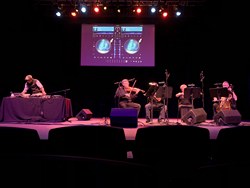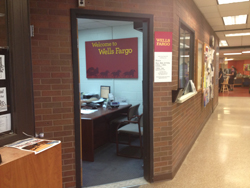Paul D. Miller, also known as DJ Spooky, performed on Tuesday Oct. 2nd in Pollak Theatre. Miller came to the University to showcase his work on bringing music and climate change together in a contemporary approach to promoting awareness of global warming.
The event is part of ArtNow, a performance and lecture series organized by a committee of faculty members that aims to bring events focusing on performance, technology, and art to campus. DJ Spooky’s performance at the University was also co-sponsored by The Urban Coast Institute, Honors School, Department of Chemistry and Physics, and Monmouth Review.
The formatting of Miller’s performance included hearing passages of his book along with music remixes. Audience members also heard the method to the madness behind his book. “Tonight’s going to be a little bit about some of my written work and then part of it’s going to be a conversation between some of the places I visited and the process of writing my book,” stated Miller.
Miller was accompanied by Shadow Lawn chamber players, a string quartet that made the melodies Miller mixed possible. One of the University’s own music faculty members, Michael Gillette, a specialist professor of music and theatre arts, was one of the instrumentalists.
Tarin McGee, a senior graphic design student appreciated Miller’s artistic approach. “A concert event that was visually and sonically exciting,” noted McGee.
The Book of Ice chronicles Miller’s research on Antarctica and his time spent there. Officially available to the public in late July, the book examines the uncharted landscape of Antartica in comparison with the social and climate problems faced in government-driven nations. According to Miller’s official website, he collaborated with Columbia University’s Brian Greene, from Columbia University, and Ross A. Virginia, Director of Arctic Studies at Dartmouth College and a world-renowned expert on Antarctica on the book.
Along with a backdrop of Antarctica, Miller incorporated music, specifically remixes into his act. “Half the battle right now is getting people to feel the sense that the world is absolutely, as we know it changing,” explained Miller as one of the struggles his faces in his line of work. “It’s [climate change] an apocalyptic situation going on globally with the environment.”
Antarctica is a location that is connected to one of DJ Spooky’s heroes Matthew Henson, an African American explorer that led the expedition to the find the North Pole. “What was powerful about this was that he didn’t really get any credit, but he did end up talking to the indigenous people to find paths,” argued Miller. “The conversation between him and the indigenous people allowed him to find best routes because the indigenous people knew the land.”
“Tonight’s going to be a little bit about some of my written work and then part of it’s going to be a conversation between some of the places I visited and the process of writing my book,” stated Miller.
Miller aimed at maintaining a relaxed atmosphere throughout his performance and asked the audience to imagine themselves in his house in New York. “I want tonight to feel like a conversation and you’re at my house in New York, and I’ve got a whole bunch of pillows out” he explained.
Before remixing the pieces, the Shadow Lawn chamber players played the piece, so the audience was able to hear it. After it was played, Miller remixed it using his software apps, DJ Spooky and DJ Mixer. The software used to create the mixes, the DJ Spooky and DJ Mixer Apps, can be found on iTunes and have been downloaded by 15 million people so far.
During the remix sessions, looping was a technique used to make certain sounds or melodies repeat themselves.
The pieces played were inspired by different parts of Miller’s travels in Antarctica. For example, his first piece, “Check your Math,” was created with the temperature differentials of Antarctica in mind. Other pieces did not have as much of a connection to Antarctica but were more associated with logical principles. Miller’s last piece, “Isonification,” was written with the mathematician Johan Keppler in mind, specifically his essay on the structure of the snowflake.
Miller argued that there is a sense of connection when it comes to music. “When you think about sound you really have to think about interconnectivity,” said Miller. “As an artist, there’s always a connection between devices and techniques.” “Music is the most emotionally powerful,” commented Miller when discussing the power behind his work.
Corey Dzenko, Ph.D., and an assistant art history professor explained the process of how the committee chooses an event. “Every spring Art Now’s committee members meet to suggest various artists as our guests for the following year.” “Through brainstorming, we often find a theme that we can use to connect our guests each season,” said Dzenko.
Walter Greason, Ph.D., an Associate Professor and Chair of the Department of Educational Counseling and Leadership, as well as a driving force of the Honors School explained the merits of having Miller perform on campus. “Our departments need more examples of interdisciplinary collaboration,” said Greason. “The Honors School offers these opportunities every day, but “The Book of Ice” featured a unique blend of mathematics, climate science, acoustic music, and hip hop.”
Kimberly Callas, M.F.A, and an assistant professor for the Department of Art and Design had her Sculpture I and Drawing III students attend Miller’s performance. “I want them to take away what’s possible, explained Callas. “I think we can have limiting beliefs about ourselves as being only one thing, an artist OR a writer OR a photographer, and today with how we share our work digitally, we are almost required to become comfortable with a variety of mediums.”
Miller was originally scheduled to perform in Spring 2018 as part of last year’s theme, “Place and Play.” However, due to a snow storm that closed campus, Miller was rescheduled to perform this fall.
Even though Miller’s performance was delayed, it still falls under the theme for the series’ theme for this year: “Performing Social Change.” “His [Miller’s] The Book of Ice fits in this theme based on the connections he makes between climate justice with social justice,” noted Dzenko.
Justin Demattico, a junior fine arts student and one of Callas’ students weighed in on the impact of Miller’s work. “Miller put on a thought-provoking show about global warming and combining it with music was an overall amazing sensory experience,” commented Demattico.
Miller grew up in Washington D.C. during the 1970’s and 1980’s, a time for politics and activism, in the words of Miller. He came from an educated family, with his father being a law professor and his mother a historian. Miller aspired to be a diplomat in foreign services and attended Bowdoin College.
“I was never in my wildest imagination planning on being a musician, although I collected records,” stated Miller. What sparked an interest in a career in the music industry was a lack of good parties and music at Bowdoin.
“I started my own party on campus named the Pub and I played all underground New York music,” said Miller. “My party on campus would be wildly popular and I charged $5 at the door.” “For a freshman or sophomore making $2,000 on a Friday night was like wow,” elaborated Miller. When he graduated, Miller moved to New York City and began throwing parties similar to the ones in his college days.
Miller has been a DJ for 20 years, with a career ranging from working at parties and clubs to more contemporary work with traveling the world and promoting awareness through music. Miller has had his work presented at the Sundance Film Festival and worked with National Geographic. Currently, he is planning on traveling to India for his next endeavor and will have an album coming out in 2019.
PHOTO COURTESY of Kimberly Callas



